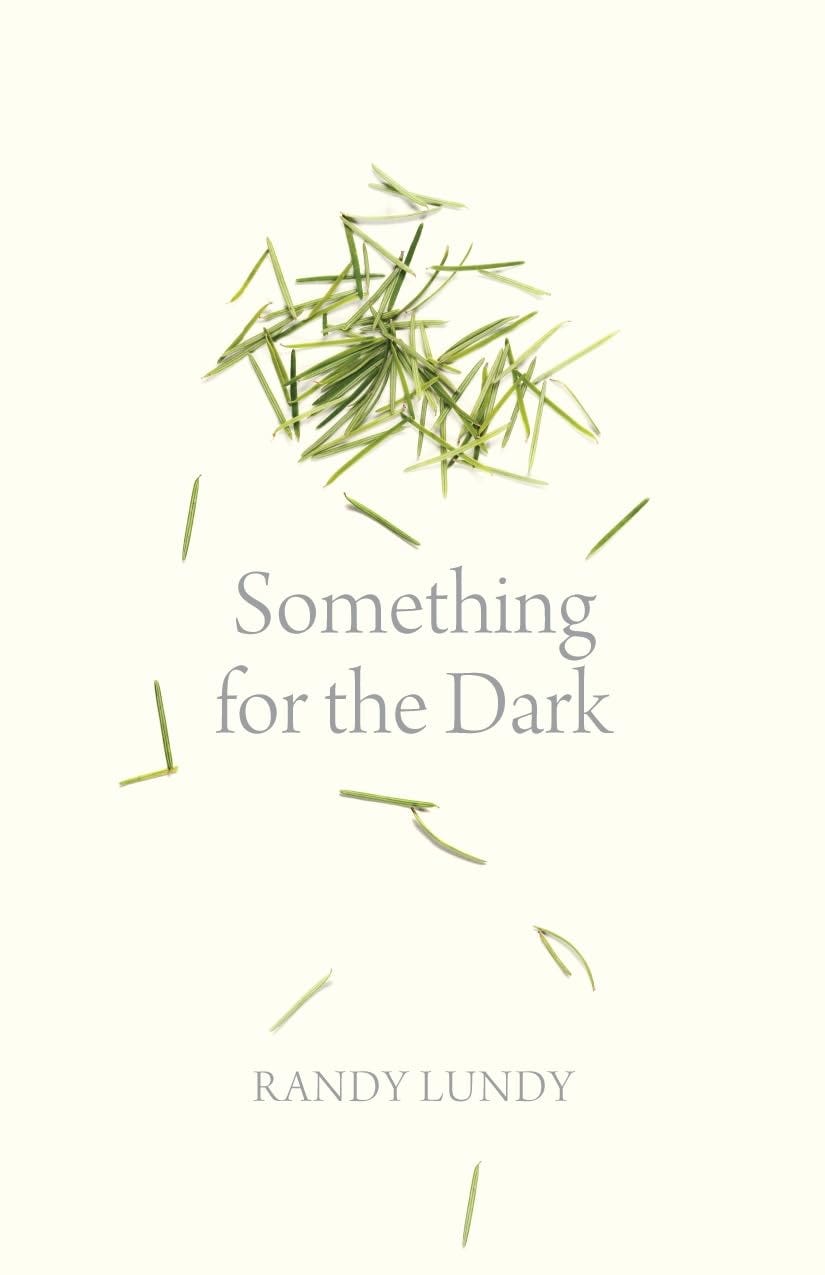Something for the Dark by Randy Lundy
“Lundy has a knack for crystallizing wisdom…”
Randy Lundy is an extraordinary poet, and Something for the Dark is an extraordinary book. Lundy operates at a level of awareness that eludes most humans. He’s a skilled naturalist when observing the local flora and fauna, and a psychologist when he turns his gaze toward his own species. He’s a philosopher working across disparate religious and cultural traditions. As a poet, he’s a craftsman, constructing a spare and beautiful house of words.
Some background here: Something for the Dark is Lundy’s fifth full-length poetry collection, and his third with University of Regina’s Oksana Poetry and Poetics series, for which he also serves as series editor. He’s a member of the Barren Lands First Nation and is of Cree, Irish and Norwegian descent, born in Manitoba but living much of his life in Treaty 4 territory in Saskatchewan, whose landscapes underpin this collection. More recently he’s taken up a teaching position at University of Toronto Scarborough.
“Lundy has a knack for crystallizing wisdom without ever veering into Hallmark territory, which is no easy thing.”
Reading Something for the Dark, we find ourselves very much at the feet of a teacher. Lundy has a knack for crystallizing wisdom without ever veering into Hallmark territory, which is no easy thing. Take these lines from “Song of Autumn,” where he warns, “Beware of this: language discriminates— / this thing is not that thing. But it is, even if // metaphor fails to build its bridge. / Better to listen to the birds and trees ….” Or this remark from “Thinking of the Botticelli Girl, Ten Years Later”: “… And maybe ego / and out-of-control drunk come down to the same thing.” Lundy draws freely from academic traditions (semiotics, psychology) but grounds them in the lived world of birds and trees and drinking sprees, tossing out a line of thought and reeling it back in with a real, wet fish at the end.
The poems in Something for the Dark are accessible, in the sense that they’re written in sentences and aligned to the left margin, but Lundy turns out some striking, visceral imagery. In “Ars Poetica” there’s an “Almost-full-now moon, / intestine of jet trail dragging / from its side, twisting / behind. // Like a gut-shot animal. / Like a childhood.” He’s bold and confessional, addressing the errors of his past and a difficult relationship with his late father. He might drink green tea these days but the poems often see him with a pot of coffee and a cigarette, nursing a hangover or remembering a woman he didn’t much get to know in an alcohol-fueled evening some years ago.
His ability to thread between literature and life experience adds gravitas to the work. Poems in this collection put him in conversation with Charles Wright, Paul Zimmer, and Danez Smith. He throws in references to Orpheus and to Dylan Thomas’s “force that through the green fuse drives the flower.” While I’m not sure if it’s intentional, it’s hard to read the poem “A Kind of Knowing” (about finding a dead deer on the side of the road) without thinking of William Stafford’s “Traveling Through the Dark”—but whereas Stafford’s identification with the deer is only momentary, flanked by typically Western modes thinking and action, Lundy feels himself “in close proximity to that. // You are the winter-brittle tongues of grass, unspeaking, pressed / beneath the weight of the deer’s body, its particular kind of knowing.”
This poem, “A Kind of Knowing,” gestures as well to the different ways of knowing available to Lundy as an Indigenous man living in Western society who’s also drawn toward an Eastern Buddhist viewpoint. Crows congregate around the deer’s body, “the largest bird perched at the the tip of the tallest rib, a strip of meat / in its beak, a red prayer flag hanging limp in the February wind.” The poem that opens the collection, “A Letter from Kyoto,” speaks of a friend’s pilgramage to a Shinto shrine but also name-checks that foundational European Enlightenment philosopher René Descartes. Lundy finds points of connection between “… Buddha and / Bashō, Rilke and Blake …” but at the end of the day it all comes back to everyday speech and the world of experience. “What is it you want, dear reader, my friend?” he asks in “Species Problem, The Audience That Wasn’t.” “I come to you robed in an animal’s skin, with / antlers tied to my head. I shake the rattle, beat / the drum, and sing. Still, the only words I have / for you are these, the simplest ones, in the same / language you speak.”
Speaking of language, as we near the end of the book, he briefly succumbs to resignation: “These days, I wrestle with no angels. I wrestle // with words. And no one is saved.” But we are. If just for a moment, we are.
About the Author
Award-winning poet Randy Lundy is a Cree, Irish, and Norwegian member of the Barren Lands First Nation, Brochet, Manitoba. Born in Thompson, Manitoba, he lived most of his life in Saskatchewan before recently taking a teaching position at University of Toronto, Scarborough.
About the Reviewer
Dawn Macdonald lives in Whitehorse, Yukon, where she grew up without electricity or running water. She won the 2025 Canadian First Book Prize for her poetry collection Northerny. She posts weekly at Reviews of Books I Got for Free or Cheap (on Substack), as well as reviewing for journals and for The Seaboard Review.
Book Details
Publisher : University of Regina Press
Publication date : Sept. 2 2025
Language : English
Print length : 96 pages
ISBN-10 : 1779400888
ISBN-13 : 978-1779400888





